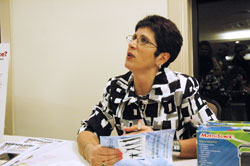Parents need to monitor children’s media use, speaker says

Catholic author and radio show host Teresa Tomeo of Detroit autographs a book after her keynote speech at the Catholic Radio 89.1 FM dinner on April 16 in Indianapolis. Tomeo collaborated on two books for Catholic teenagers, and also wrote books about the media influences on culture and the media’s affect on her own life. (Photo by Mary Ann Wyand)
By Mary Ann Wyand
It’s a simple and effective solution, but it’s not always easy to do.
Catholic radio show host and author Teresa Tomeo, a veteran broadcast journalist in Detroit, wants parents to take control of media exposure in the home in order to have a stronger, happier, healthier and more faith-filled family.
During her keynote speech for the Catholic Radio 89.1 FM fundraising dinner on April 16 in Indianapolis, Tomeo urged parents to closely monitor their children’s television, radio and Internet use on a daily basis.
An award-winning mainstream journalist for two decades, Tomeo said she became disillusioned by trends in the secular media toward sensationalism, violence and a liberal bias.
Nine years ago, she left the secular media to work in the religious press, and since that time has written Noise—How Our Media-Saturated Culture Dominates Lives and Dismantles Families and News Flash, a testimonial about her return to the Catholic faith.
Tomeo hosts “Catholic Connections” each weekday at 9 a.m. on Catholic Radio 89.1 FM in central Indiana and on more than 100 other Catholic radio stations.
She told an attentive audience that accepting the challenge of the new evangelization—a major theme and mission of Pope John Paul II’s pontificate—requires ongoing education about the Catholic faith.
“We have a huge cultural battle on our hands right now,” Tomeo said. “Our challenges are even greater than
evangelizing because of our culture. … We have to get the word out about the Catholic Church.”
Many Catholics were poorly catechized, she said, and don’t even know the basics of Catholicism.
“In this day and age, … we are all going to be responsible for what we know [about our faith] when we get to the pearly gates,” Tomeo said. “Even those of us who are trying to live our lives as good faithful Catholics will come up against struggles and temptations in the world, and the media is a huge temptation for many of us because it’s everywhere. We can’t ignore the connection between the media and what’s happening in our lives.”
People of faith should always be hopeful and never let the devil or anyone else steal their joy, she said. “We have to get back to building the kingdom of God.”
Educate yourself about Church teachings, Tomeo said, and then educate other people about the Catholic faith.
Tomeo also recommended that Catholics consider three questions:
-
How are my media habits impacting my relationship with God?
-
How are my media habits impacting my relationship with my family?
-
What can I do about media influences?
She said a study conducted by the Center of Addiction and Substance Abuse found that when families eat dinner together regularly—without media interference—the rate of alcohol use and drug abuse by children drops significantly.
“That’s how important that quality time with no interference is for kids,” Tomeo said. “Kids are still going to listen to their parents over the media if they have a relationship there, but the problem is that so many parents are so busy, so overwhelmed, and don’t have a clue as to what their kids are watching and listening to. They let the media raise their kids.”
Pope Benedict XVI also shares this concern about media influences, she said. Two years ago, he said, “Put simply, we are no longer able to hear God—there are too many different frequencies filling our ears.”
Tomeo said researchers found that on average American children and teenagers spend almost eight hours a day with the media, which includes the Internet, other computer use, television, radio, cell phone calls and cell phone texting.
“Kids are spending as much time with the media every week as most [adults] spend at their full-time jobs,” Tomeo said. “It’s pretty scary stuff—sexual content in the media, violent content in the media, the Internet and cell phones, and the push to make kids get older younger.”
Generation Diva refers to how our cultural obsession with beauty is affecting young girls and their self-esteem, she said. “This is a huge, huge problem. … Recently, there was a big study on the connection between pregnancy rates among teens who watch sex-laden TV shows on a regular basis. The [pregnancy] rates among them are twice as high as those teens who don’t view as much sexual content.”
Tomeo cited some alarming statistics that parents need to be aware of:
- Children view at least 14,000 sexual messages a year on television alone.
- 70 percent of TV programs contain sexual content.
- Exposure to violent media makes young people more likely to be violent or aggressive.
- Children see 100,000 violent acts on TV by the time they are 13. By the time they are 18, it doubles to 200,000.
“Researchers say the media does have an impact,” she said, “especially on children in terms of violent behavior.”
The solution is simple and effective, but hard for many parents, she said. Monitor the media habits of your children, and be their parent and not their friend.
(Catholic Radio 89.1 FM programming
can also be heard online at www.catholicradioindy.org. For more information, call 317-870-8400.) †
